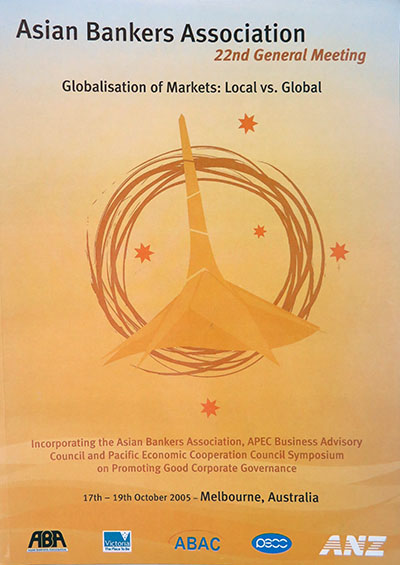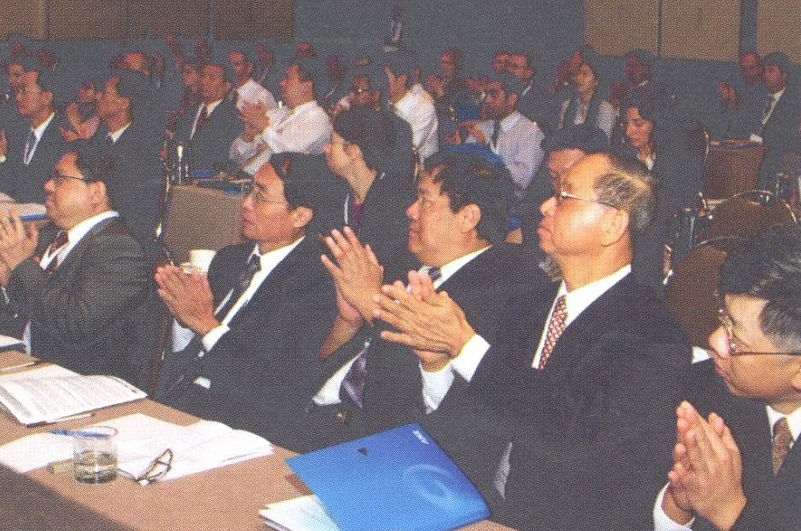Asian Banks: Measuring Up to New Challenges
17-18 October, 2005
SUMMARY OF THE PROCEEDINGS
1. The 22nd ABA General Meeting and Seminar was held on 17-18 October 2005 at the Crown Promenade Hotel in Melbourne, Australia. Some 120 high-ranking executives, banking experts, and government officials from 18 countries attended the two-day meeting.
2. Hosted by the ANZ Bank, this year’s gathering focused on the theme ”Asian Banks: Measuring Up to New Challenges.” Eminent speakers shared their views on current developments in the world financial markets and their impact on the global and local players in the region’s financial and banking industry.
3. The 36th Board of Directors’ Meetings was also held in conjunction with this year’s annual meeting. The ABA Board discussed policy matters and reviewed the status of the various ongoing ABA projects and programs.
4. The ABA also co-organized with the APEC Business Advisory Council (ABAC) and the Pacific Economic Cooperation Council (PECC) a symposium on corporate governance on 19 October 2005. Entitled ”Promoting Good Corporate Governance and Transparency in APEC Financial Institutions,” The ANZ Bank helped in promoting and in administering the symposium and sponsorship support was provided by the Australian APEC Study Centre, the Australian Institute of Securities Finance and Banking and by the Monash University Graduate School of Business

THE SEMINAR
5. The Honorable Andre Haermeyer, MP, Minister for Manufacturing and Export, Minister for Small Business, and Minister for Financial Services gave the official Welcome Remarks during the Opening Ceremony of the seminar. Professor Ian Harper, executive Director, Centre for Business and Public Policy, Melbourne Business School, was the Keynote Speaker.
6. The seminar was divided into two major sessions, with the following topics, speakers and commentators:
- The two morning sessions focused on the theme “Understanding Key Banking Issues in Key Markets”. The speaker discussed the changes brought about by regulatory reforms (including Basel 2), the continuing evolution of Asian financial markets, and the inevitable advance of globalization and how these issues, particularly those related to regulation, governance, consolidation and competition, are being played out in four large and fast-growing Asian markets – China, Vietnam, India and Indonesia.
- The two morning sessions featured the following session chairmen and speakers: Dr. David K. P. Li, Chairman and Chief Executive, The Bank of East Asia Ltd.; Mr. Saul Eslake, Chief Economist ANZ; Mr. Pham Quang Dzung, Director of Financial Institutions Department, The Bank for Foreign Trade of Vietnam; Mr. Stephen Holden, Regional General Manager, Asia, Commonwealth Bank of Australia; Mr. Christ Mouat, Director China Partnerships , ANZ; Mr. Richard A. Woolcott, AC, Founding Director, The Asia Society Austral Asia Centre; Mr. Hans Theilkuhl, Strategic and Finance Director, Bank Permata; Mr. S. Mohan, CEO of State Bank of India Sydney Branch; and Mr. Rajendra Theagarajah, Chief Executive Officer and Managing Director, Hatton National Bank.
- The two afternoon sessions addressed the topic ”Global Players Impacting Asian Financial Markets.” Speakers discussed how global and regional banks are expanding their activities in the Asian region to seize opportunities for growth and gains in market share. They also noted how Asia’s local banks are emerging either from crisis or reform coming face to-face with these global and regional players. Discussions focused on the impact of these players on Asia’s financial markets, particularly with respect to issues related to strategy, technology, competition and market opportunities.
- The afternoon speakers and session chairmen were: Mr Joseph Lyu, Chairman, Bank of Taiwan; Mr. Elmer Funke-Kupper, Group Managing Director, Asia Pacific, ANZ; Mr. Jeremy Nestel, Managing Director – Australia & New Zealand, The Citigroup Private Bank; Mr. Ken Waller, Commonwealth Bank of Australia; Mr. Joey Bermudez, President, Chinatrust (Philippines) Commercial Bank Corp., Dr. Heh-Song Wang, Professor of Economics, Graduate Institute of Finance, National Chiao Tung University; Mr. Philip Gentry, Head of International Trade Finance, ANZ Bank; Mr. Jon Nicholson, Senior Vice President and Partner, Boston Consulting Group; Mr. Ridha Wirakusumah, Asia Bank COE Leader, President & CEOP South East Asia, GE; and Mr. Frank Mallia, General Manager-Asia, National Australia Bank.
36TH ABA BOARD OF DIRECTORS’ MEETING
13. ABA Chairman Mr. Dong-Soo Choi convened the 36th Board Meeting in the afternoon of 17 October 2005. Among others, the Board:
- Formally adopted a set of guidelines for informal workouts and endorsed a template agreement for company restructuring for use of financial institutions throughout the region.
- Approved two position papers. One is entitled ”Providing the Legal and Policy Environment to Support Effective Informal Workout Regimes in the Asia-Pacific Region,” which contains recommendations that complement the adoption by the ABA of the guidelines for informal workouts and its endorsement of the template agreement for company restructuring. The second position paper is entitled ”Promoting Good Corporate Governance in the Asia -Pacific Region,” which endorsed the adoption of the OECD Principles of Corporate Governance and the PECC Guidelines for Good Corporate Governance Practice.
- Admitted three new members, including Golomt Bank from Mongolia and the JSB Trust Bank from Uzbekistan as Regular Members, and the Deposit Insurance of Vietnam as Associate Member;
- Endorsed the following recommendations of the ABA Advisory Council:
* That the ABA add more names to its membership roster by focusing its recruitment efforts on both the traditional and nontraditional sources of member applicants, including the following: in Asian countries where there are currently no members at all, particularly China in Asian countries where there are only few members, particularly Japan, India, Malaysia.
* That the ABA continue to pursue its important work in the area of policy advocacy, particularly in regional bond market development, as well as in providing training and other capacity building programs for members
- adopted the Audited Financial Report for the period ended December 31, 2004, and noted the unaudited Financial Report for the first seven months of 2005;
- Reviewed the activities of the Association over the past year, including those related to the various training courses offered to member, policy advocacy work on issues of current concern to members, membership expansion, and the strengthening of relationships with other regional bankers associations and multilateral organizations, among others.
- Agreed to hold the 23rd General Meeting and Seminar in Taipei in 2006, which also marks the 25th Anniversary of the Association.
22nd ABA GENERAL MEETING PROPER
14. The 22nd General Meeting Proper held on 18 October and presided by ABA Chairman Mr. Dong-Soo Choi approved the Chairman’s Report, which summarized the activities undertaken by the ABA over the past year in the area of policy advocacy, training programs for members, membership drive, relationship with other regional bankers groups, and participation in other regional events.
SYMPOSIUM ON PROMOTING GOOD CORPORATE GOVERNANCE
 15. The symposium, sponsored by ABAC, ABA and PECC was held on 19 October 2005 in conjunction with the ABA’s 22nd Annual Meeting in Melbourne. Around 90 people attended including banking representatives from the Asia Pacific Region, senior financial system regulators, senior representatives of regional and international financial institutions, representatives of industry and professional associations and institutes and academics and post graduate stude11ts from Australian universities.
15. The symposium, sponsored by ABAC, ABA and PECC was held on 19 October 2005 in conjunction with the ABA’s 22nd Annual Meeting in Melbourne. Around 90 people attended including banking representatives from the Asia Pacific Region, senior financial system regulators, senior representatives of regional and international financial institutions, representatives of industry and professional associations and institutes and academics and post graduate stude11ts from Australian universities.
16. Among the conclusions of the Symposium were the following:
- Improving governance is important for communities, business and regional and global economic and financial integration; in banking, the implementation of Basel II and its focus on risk management is a major development
- High quality governance in all aspects of financial systems – public and private – is critical given the central role of finance in economic growth and development
- Internationally governance standards, promoted by the OECD and the BIS are broadly endorsed as highly relevant to the APEC region and should be implemented in financial communities
- Cultural factors governing relationships in individual communities should be fully recognised as economies attempt to adapt to internationally agreed standards; “There is no one size fits all” and overly prescriptive directives about corporate behavior ought to be avoided
- Governance in terms of probity, personal integrity and “the right way of behaviour” is unchanging and at the heart of business relationships; governance is also an evolving concept and reflective of changing business structures and ownership and management, and as such subject to societal pressures to fairly reflect the interests of groups and society broadly within an acceptable legal framework
- The tendency however for governments to bend to pressure to over prescribe on how business relationships should be conducted is a critical aspect of the governance debate; how far good governance should be reflected in black-letter law or developed on a principles based approach is a relevant issue for further consideration in APEC
- Governance is seen at micro level in terms of within a firm or corporation; at the national level, in terms of the way in which governments relate to their citizens and businesses through the conduct of ministries and various agencies; good or better governance in an economy will help support regional economic integration
- Measures to improve governance, through benchmarking at the macro and micro level are very important in supporting economic growth and the social enhancement of emerging markets, and capacity building to do this should be a major APEC priority
17. The symposium came up with the following recommendations, among others:
- APEC economies should be encouraged to implement Basel II and in so doing, bank regulatory agencies and banks encouraged to develop improved risk management capacities
- improved risk management is as relevant to all financial services sectors as it is to banking and risk management processes and techniques should be encouraged and promoted by non-bank financial regulatory agencies and by non-bank private sector financial institutions.
- banking and other financial sectors ought to develop measures for fit and proper persons tests for appointments to boards and senior management positions and to implement independent audits.
- information, transparency and accountability are critically important factors that are at the essence of good governance and should be given priority by APEC financial institutions in both the public and private sectors.
- financial regulator agencies and financial policy arms of APEC economies should usefully review their own governance arrangements to ensure they comply with highest governance standards
- APEC economies and in particular emerging economies should participate in the IMF/World Bank FSAPs and ROSCs programs which are aimed to support the development financial system infrastructure







